Latinx Mental Health: Fighting for Policy Change
"I began this work in memory of a close friend I lost to suicide and in keeping her memory alive, I found my life's purpose." -Ane
How do you support Latinx mental health?
It definitely has been a journey filled with gratitude, where no day is the same. One day I can be driving three hours out to a rural part of my state to provide a suicide prevention training for a school. The next day I'll be working on mental health policy change. At times it's been late nights on a Friday evening (because that's when a crisis happens), calling all my mental health contacts to successfully identify a provider who can take in a new client immediately. Some days it's sitting on the sidewalk sharing a sandwich with my friend Aaron, who is homeless and suffers from mental illness--hoping that our conversation will get him to agree to see a provider. It's nights filled with frustration over our broken mental health system and broken policies that don't help Aaron.
Then there are the days where I'm in the middle of providing a youth suicide prevention training and see a big smile run across a young girl's face and hear her say how grateful she is to learn how to help a friend in crisis. All of this keeps me going. Advocacy has taught me to never take no for an answer when it comes to fighting for access to services for others in need and it has filled my life with beautiful people who inspire and have changed me for the better. I began this work in memory of a close friend I lost to suicide when I was thirteen-years-old and in keeping her memory alive, I found my life's purpose.
What are some of the biggest myths you’ve heard about Latinx mental health? How do you dispel these myths and fight stigma?
The "one-size fits all" approach to providing mental health resources/services for the Latinx communities is definitely a something that needs to be worked on. We are a beautiful and multifaceted culture and the treatment should be reflective of that. Those in our community should have the ability to access services in their native language and meet with a therapist who understands and appreciates the culture. Asking for help is not easy, so we need to do everything possible to create an environment in which the individual will want to continue with their treatment. The best way to dispel these myths and rid the stigma is to encourage more Latinx individuals to become the mental health providers and therapists.
What are some tips you give to young Latinx with mental health concerns?
Never be afraid or ashamed to ask for help and never let anyone discourage you from getting help. No matter how tough the road gets, do not give up and know that you're never alone.
What are some resources you suggest for the Latinx community?
I have been very fortunate to cross paths with some of the very best mental health champions like my former boss, Congresswoman Grace F. Napolitano (California District 32) and Dr. Luis Garcia from Pacific Clinics Behavioral Health Clinic (Santa Fe Springs, CA). Together they started a youth suicide prevention program in Southern California, which works directly with Latinx students and their families. Not only are services provided in English and Spanish, but it is a requirement for families to learn the ins and outs of mental health together. Realizing the barriers that many parents face in raising a family, clinicians put washers and dryers at one of their facilities so parents could get errands done while their child was receiving services. These are the small things that make a difference and have the most impact.
Congresswoman Napolitano is also the founder and chair of the Congressional Mental Health Caucus in Washington, DC and has worked and partnered with numerous mental health organizations to create policy change. The National Latino Behavioral Health Association (NLBHA) is another wonderful organization I have worked with in the past. They focus directly on Latinx mental health and raise funding for scholarships for Latinx youth who are going into the field of mental health.
Follow Ane on Twitter and Facebook.

